‘Why I don't want to own the land my business is built on’
- Published
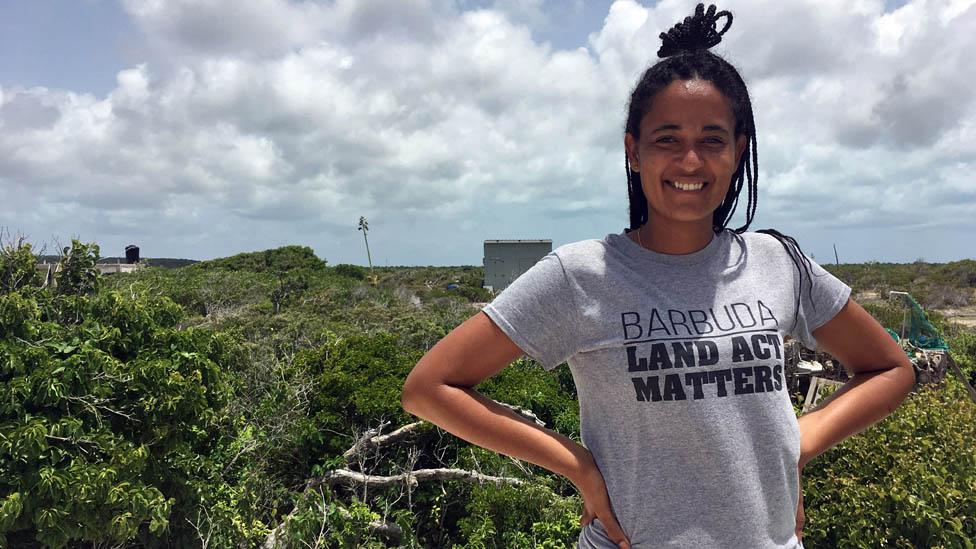
Hurricane Irma smashed its way across Barbuda in September 2017. It left a catastrophic trail of destruction. And when, in the aftermath, the island's government resolved to introduce a system of private property, this kick-started old tensions.
Asha Frank hosts intrepid tourists in a wooden cabana built on the east of Barbuda. This is wilderness living - there is a well for fresh water, but no flushing toilet. The only sounds are from myriad birds that swoop and dive overhead and the crash of the Atlantic Ocean from beyond the sand dunes close by. You need a sturdy vehicle to get here because there is no paved road - just a roughly marked track on the stony terrain.
"Our visitors like to comb the beach. We have camp fires and grill nights. And a lot of the pictures on our website are of guests who catch fish, and then scale, cook and eat it on the spot."
Fifty years ago, you could find many pristine spots in the Caribbean like this one. That was before tourism became the primary engine powering the economies of this region, making real estate highly desirable - and the foundation of many lucrative businesses.
Compared to its neighbours and especially its sister island of Antigua, Barbuda - just 23km long and 12km wide - has remained undeveloped. And that is largely because in modern times, private property has never existed here. Since the island's slave population was emancipated in the 19th Century, land has been held in common. Barbudans do not own, but lease it to build their homes, to farm and for economic activity.
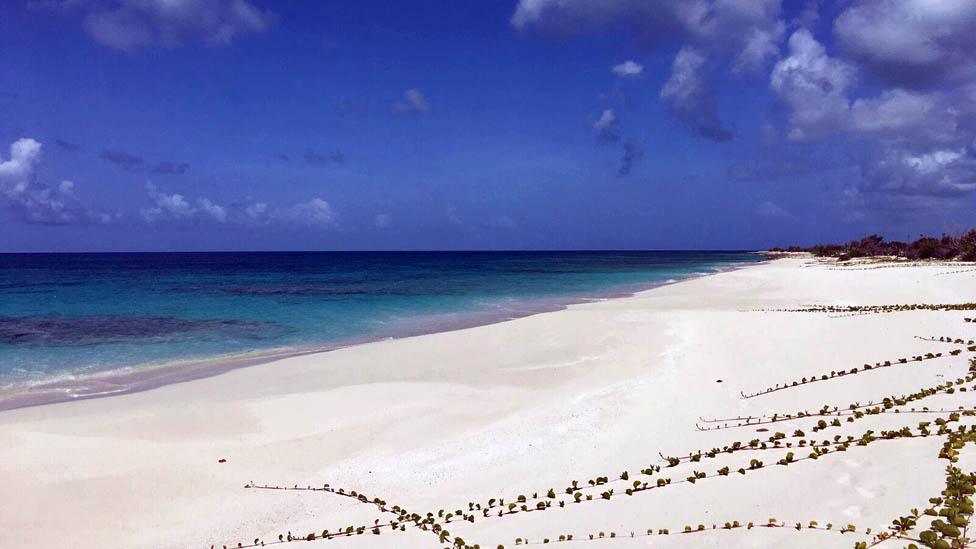
"Land is part of our culture - this is about 300 years of history," says Frank.
Because she didn't have to buy her land, she was able to establish her eco-tourism business without investing thousands of dollars.
But moves to dismantle Barbuda's system of tenure began just after Irma. Some 95% of Barbuda's infrastructure was affected by the storm - much of it was completely obliterated. There are shiny new roofs in the village of Codrington, where the majority of Barbudans live. But there is also still plenty of evidence of the destructive powers of the hurricane - piles of broken masonry, tarpaulins tightly fastened over gaping holes, and palm trees ripped from their roots.
Less than a week after the storm Gaston Browne, prime minister of the government of the twin-island state of Antigua and Barbuda, declared his intention to privatise land on Barbuda - to enable islanders to borrow against their properties and help rebuild, he said. One of his suggestions was that all Barbudans be given deeds to the land they occupy for a nominal Eastern Caribbean $1.

Find out more
Linda Pressly's documentary Barbuda: Storms, Recovery and "Land Grabs" is broadcast on BBC Radio 4's Crossing Continents at 11:00 on Thursday 15 August

Many were outraged. There is a history of antipathy between the larger, more developed island of Antigua and the people of Barbuda. Ahead of independence in 1981, and partly to protect their land rights, Barbudans lobbied the British for autonomy. Their efforts failed, and the twin-island state of Antigua and Barbuda was born.
After the horror of Irma, the government ordered the evacuation of the Barbudan population - around 1,800 - to Antigua, because another hurricane was barrelling down. Hurricane Jose passed the island by. But the government still did not enable people to return to Barbuda immediately. People complain of much greater losses because their belongings rotted for days in the open air - very few had insurance.
John Mussington, the principal of Barbuda's secondary school, came back home as soon as he could in October, 2017. But something puzzled him in those early days.
"At night Barbuda was black, because there was no electricity. But in this one concentrated area, the skies were lit up. And from where I live miles away I could hear the sound of heavy-duty equipment and bulldozer blades grating against stones… I said, 'What's going on here?'"
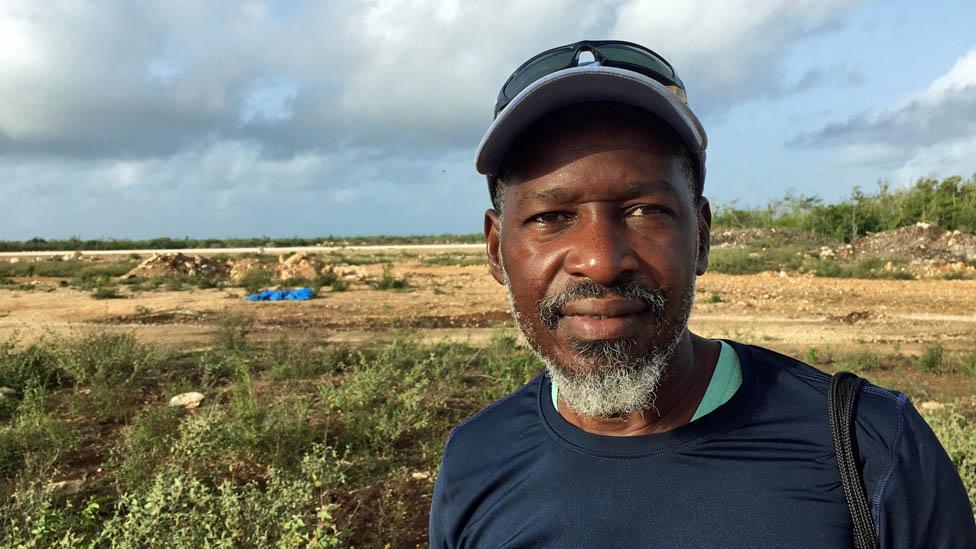
John Mussington at the site of the new airport
He went to investigate, and found work continuing on a new international airport. This was at a time when all services on Barbuda were extremely limited due to hurricane damage - even today, the island's hospital remains unusable.
The new airport exacerbated already strained relations between Barbudans and their national government. Mussington began a challenge in the courts. Prime Minister Browne was irked by opposition to the airport and said so on Facebook.
"These imbeciles have resorted to their ignorantly destructive ways, trying to undermine a much needed infrastructural project to improve the economic prospects of Barbuda," he wrote.
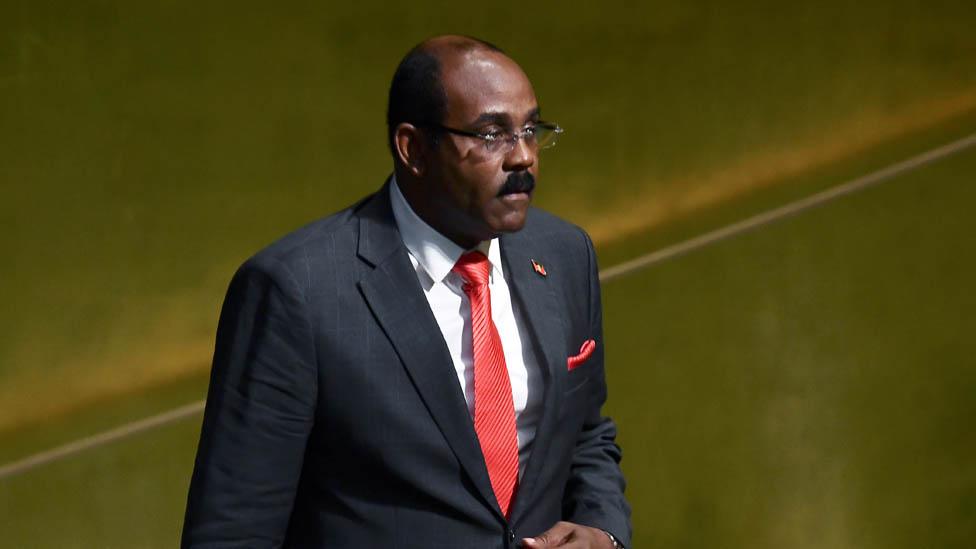
Gaston Browne
For the government, improving the island's economic prospects means more tourism. On Barbuda there are a smattering of small hotels and guest houses, and some eco-style developments like Asha Frank's. And pre-Irma, with backing from the Antigua and Barbuda government, two top-end tourist complexes acquired leases and began construction along the island's glorious sweeps of sandy beaches.
But what some see as modernisation, others look upon as a backward step.
"I have a problem with the amount of rich homes that are coming and the fact there will be no way for us to make money other than going to work for somebody else," says Jacklyn Beazer Desouza.
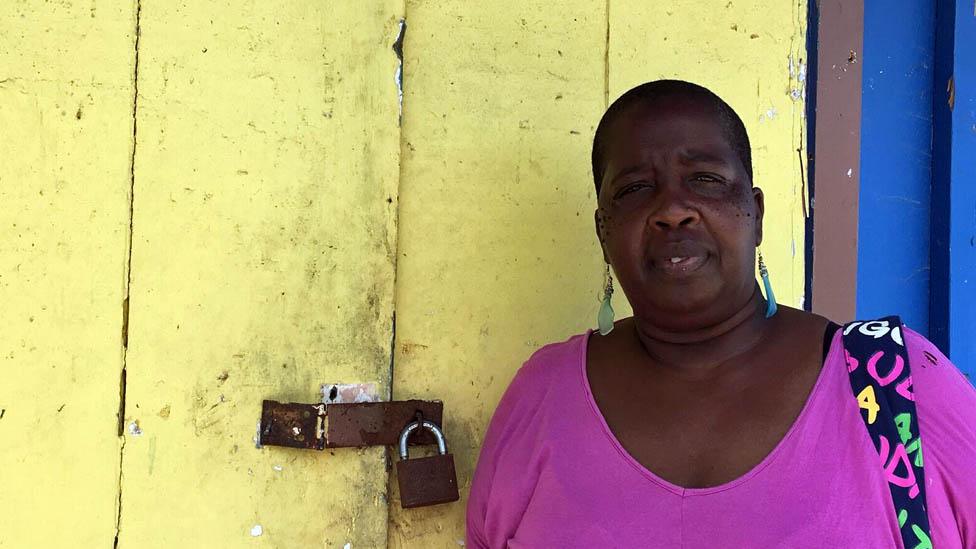
Hurricane Irma swept away all three of her businesses - a restaurant, a beautician's and a family bakery. Her home lost its roof during the storm too. This was replaced in the months afterwards by the United Nations Development Programme. But Jacklyn's business properties are still in ruins. And while she saves to rebuild, she flips burgers on a makeshift stall in her garden.
"I suppose a few of those rich people might come and see what the locals eat - our lobster and deer burgers - but I don't think we'll get a big cut of the pie," she says.
And she is worried about the future. Last year, the Antigua and Barbuda government took a major step in its efforts to introduce private property when it repealed the Barbuda Land Act of 2007 that guaranteed communal land ownership rights on the island.
"They want to surround the whole island along the coast with hotels, and big houses and stuff, so we'll be enclosed in the village," Desouza says. "And I have a problem with people from Antigua, telling me where I should and shouldn't live. That's not how we're accustomed to living here."
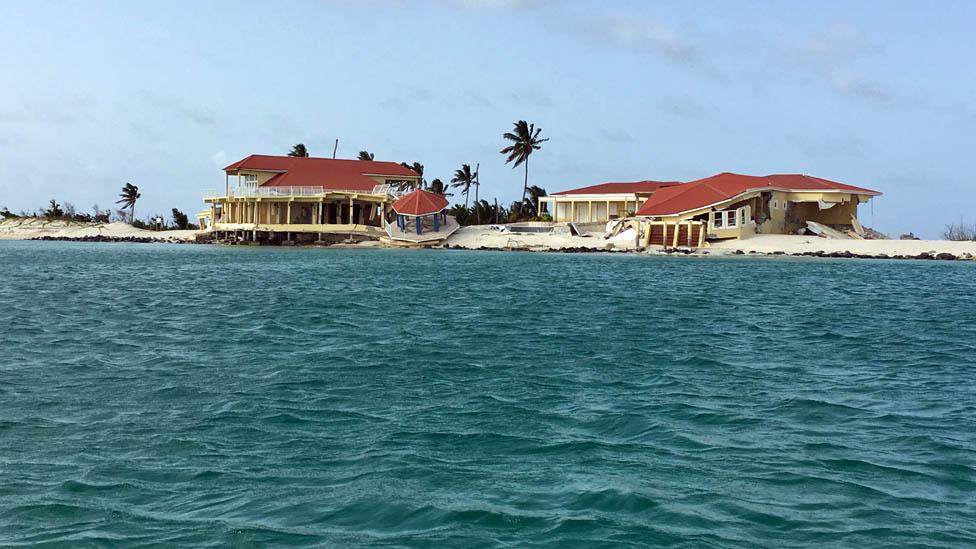
So far, the privatisation of land on Barbuda hasn't taken effect. A legal challenge, on the grounds that the government's actions are unconstitutional, means it is being held up in the courts.
"No property of any description should be expropriated by any person. We're saying it's an expropriation by the government to repeal the 2007 Barbuda Land Act," says Justin Simon QC.
"What this government wants to do is to develop Barbuda with foreign investment. But not every one of the Caribbean's islands can be a development Mecca."
The government of Antigua and Barbuda has always denied accusations it is engaged in some kind of "land grab".
"Who's grabbing the land?" asks Dean Jonas, the minister for agriculture, fisheries and Barbuda affairs.
"The land is being sold to Barbudans. The government is in the process right now of setting up a land registry for Barbuda. We have a land registry in Antigua, so now we have to set one up to survey all the lands in Barbuda, and get them registered properly in the court. So the process has started. All the land in Barbuda belongs to the government - it's important you understand that."
And there are Barbudans who would welcome change. Hasketh Daniel surveys the wreckage of his bar - roofless, and open to the clear blue sky. Pre-Irma it was a buzzing, community hub.
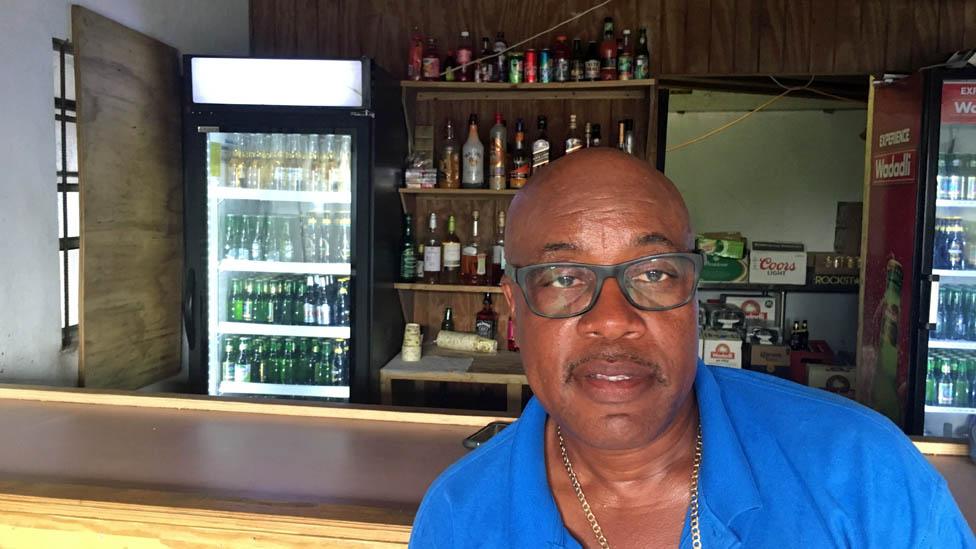
Hasketh Daniel
"This was where the action lies from Thursday to Saturday - everybody was right here," he says wistfully.
"If this was man-made stuff, I'd probably have to kill somebody. But it was the Almighty's work, so I just have to accept it."
Now, Daniel runs his bar out of what was once the storeroom. He is another uninsured Barbudan, and after nearly two years he is impatient to get on with reconstruction.
"We have rights to occupy this land, but we have nothing to prove that we're owners. If we had deeds, we'd be able to go the banks and borrow against what we own. But after Irma we weren't able to help ourselves - we had to depend on donors and the government to help us to rebuild."
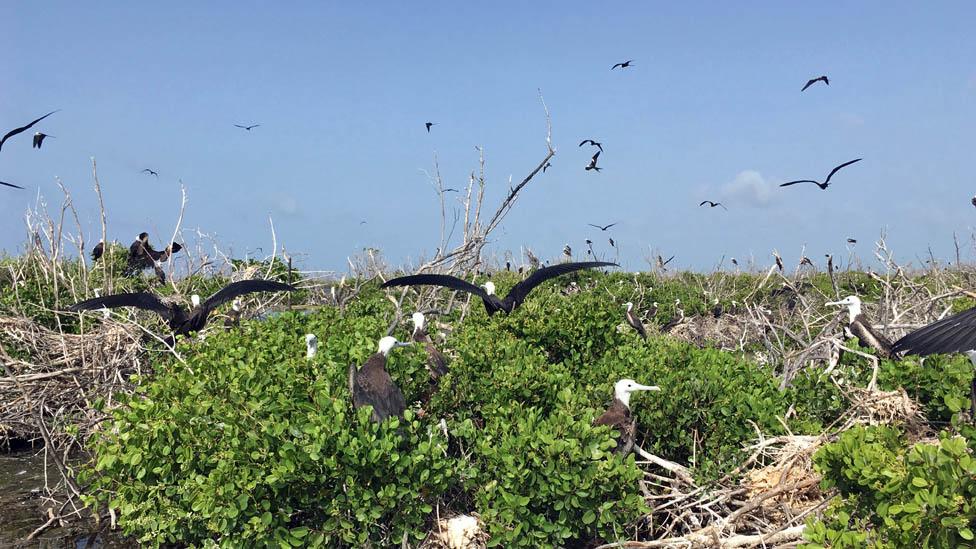
Daniel believes privatisation will put an end to the frequent disputes between Barbudans about where one owner's land begins and another's ends. And he is impatient with those who worry their children will be pushed off the island because they will not be able to afford to buy land.
"If we're trying to protect the future, we've got to set laws. So maybe if you're from Barbuda you pay $5 for the land, but if you're from somewhere else you pay $50,000 for it - we could make it more or less impossible for anyone else to buy here. And if they do buy, well, we're OK with that!"
Dikela George, who opposes the privatisation, is not taking any chances. In her early 20s, she is a teacher at the secondary school where Mussington is head, and has her own plot prepped to start building the foundations of a house.
"If we have to pay thousands of dollars for land, some of us won't be able to own homes on Barbuda. So right now it's really important we all get our own piece of land, and I think young people need to understand that."
Some Barbudans have more pressing concerns. Tenesha Beazer is one of them. Since she returned from Antigua after the hurricane, she has been living in a tent.
She shares it with her partner and two children - there is just enough room for a double and a single bed.
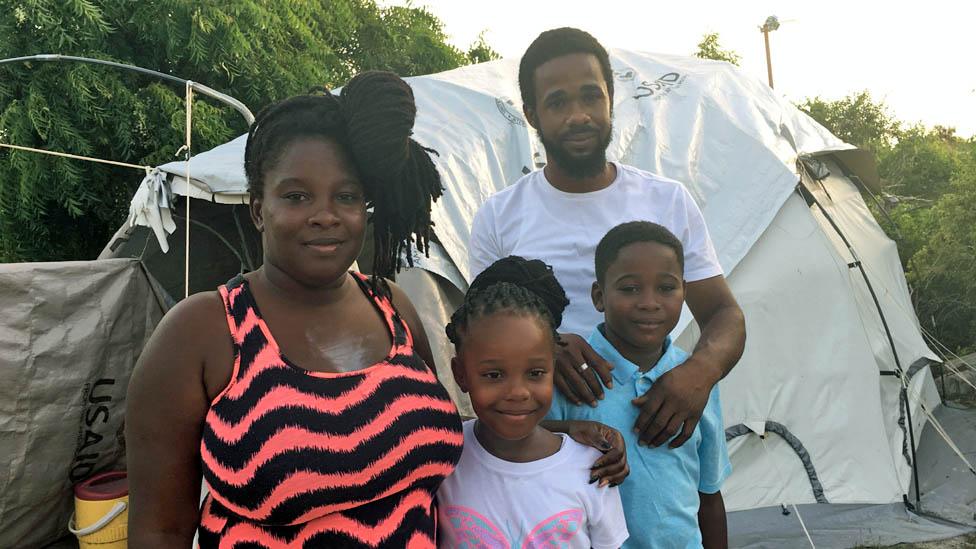
Tenesha Beazer and her family
"I try to make myself and my kids comfortable, but it's not easy. And when it's windy, you hear a lot of noise from the tarpaulin," she says.
The family have a place to shower, but no toilet - they have to go in the bush. Before the hurricane struck, Beazer lived in a home belonging to her extended family. Now it is just a dusty pile of rubble.
She has a piece of land she's hoping to build on but does not know what the change of law will mean for her - if and when it is implemented. In the long term, she fears the cost of property will rise, and local people will be priced out.
"It's upsetting, real upsetting - poor people aren't going to be able to make it if they have to buy the land."
Beazer and her family are still living with the consequences of that dreadful September night in 2017, when the heavens opened, and winds gathered speeds of over 280km/h. Many Barbudans were traumatised by Hurricane Irma. With so much rebuilding still to do, life feels uncertain for many. And if government surveyors arrive to begin marking out the land, they will get a very mixed reception.
You may also be interested in...
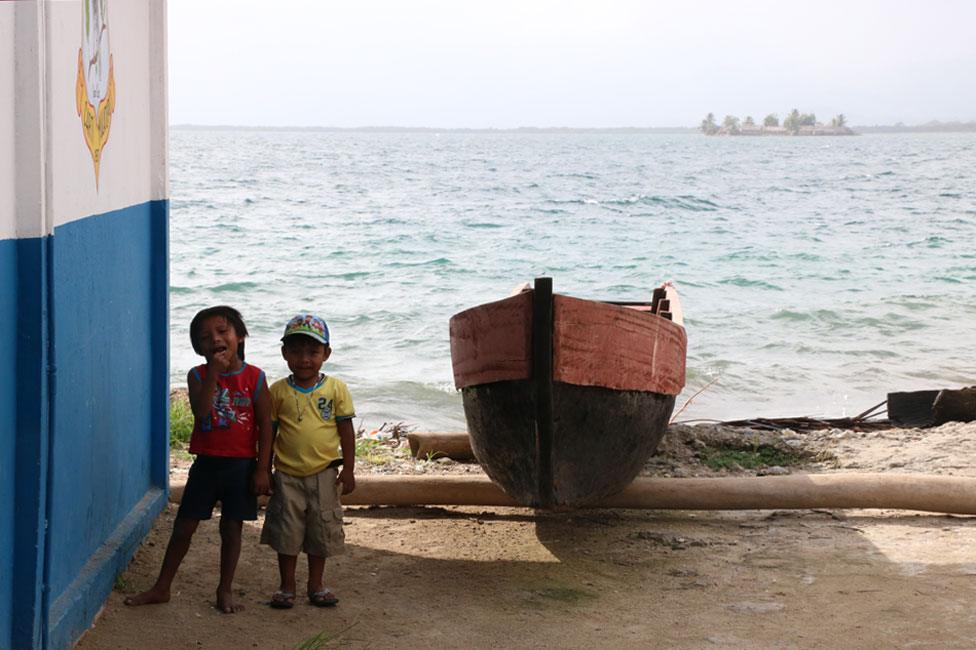
The low-lying Caribbean islands inhabited by Panama's indigenous Guna people are threatened by rising sea levels and increasingly unpredictable weather. But unlike many island communities facing such problems, the Guna have an escape plan.